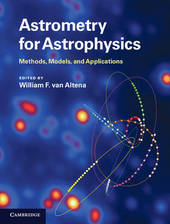
|
Astrometry for Astrophysics: Methods, Models, and Applications
Hardback
Main Details
| Title |
Astrometry for Astrophysics: Methods, Models, and Applications
|
| Authors and Contributors |
Edited by William F. van Altena
|
| Physical Properties |
| Format:Hardback | | Pages:428 | | Dimensions(mm): Height 253,Width 193 |
|
| ISBN/Barcode |
9780521519205
|
| Classifications | Dewey:522 |
|---|
| Audience | | Postgraduate, Research & Scholarly | | Professional & Vocational | |
|---|
| Illustrations |
18 Tables, unspecified; 74 Line drawings, unspecified
|
|
Publishing Details |
| Publisher |
Cambridge University Press
|
| Imprint |
Cambridge University Press
|
| Publication Date |
22 November 2012 |
| Publication Country |
United Kingdom
|
Description
The field of astrometry, the precise measurement of the positions, distances and motions of astronomical objects, has been revolutionized in recent years. As we enter the high-precision era, it will play an increasingly important role in all areas of astronomy, astrophysics and cosmology. This edited text starts by looking at the opportunities and challenges facing astrometry in the twenty-first century, from space and ground. The new formalisms of relativity required to take advantage of micro-arcsecond astrometry are then discussed, before the reader is guided through the basic methods required to transform our observations from detected photons to the celestial sphere. The final section of the text shows how a variety of astronomical problems can be solved using astrometric methods. Bringing together work from a broad range of experts in the field, this is the most complete textbook on observational astrometry and is ideal for graduate students and researchers alike.
Author Biography
William van Altena is Professor Emeritus in the Astronomy Department, Yale University, and has taught undergraduate and graduate courses in introductory astronomy, astronomical observing and astrometry for over 40 years. He served as Director of the Yerkes Observatory, Chair of the Yale Astronomy Department and was Team Leader for the Hubble Space Telescope's Astrometry Instrument Definition Team and a member of the HST Astrometry Science Team. His current research involves studies of the kinematical structure of the Milky Way in the Southern Hemisphere, binary stars and the use of high technology cameras to study galaxy remnants that are merging with the Milky Way.
Reviews'... there are some very good chapters included, giving detailed overviews of relativistic effects, interferometry, diffraction-limited imaging, CCD image detectors, etc., which all have their relevance in the subject, and make the book a useful reference or starting point for more detailed reading.' The Observatory
|